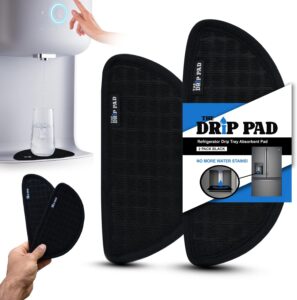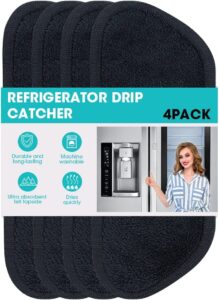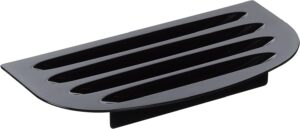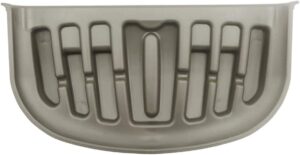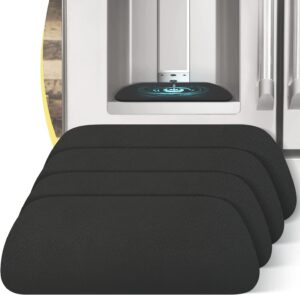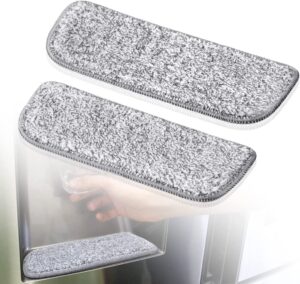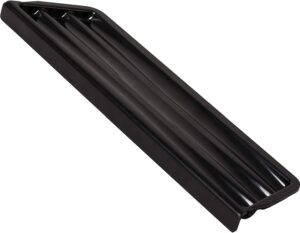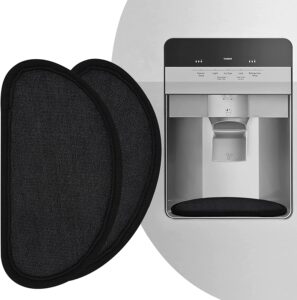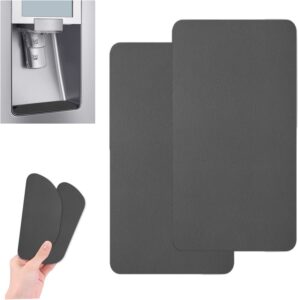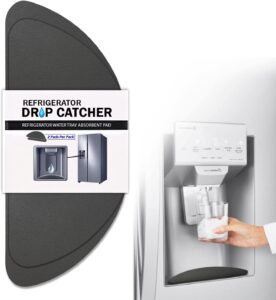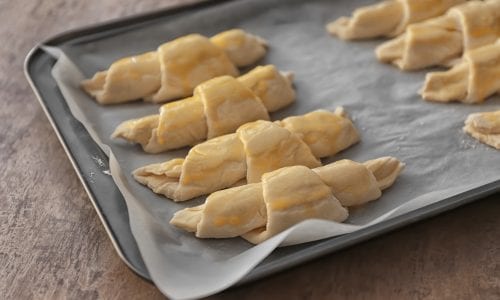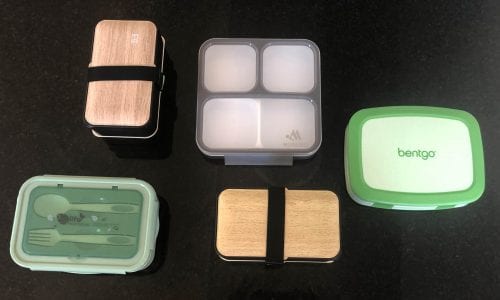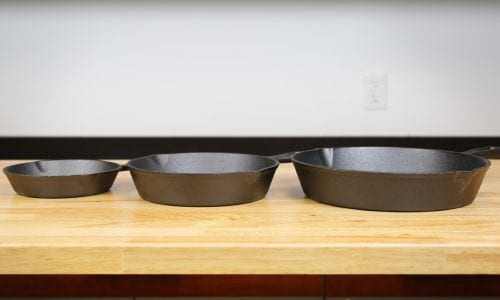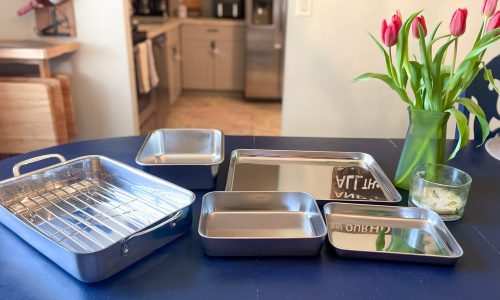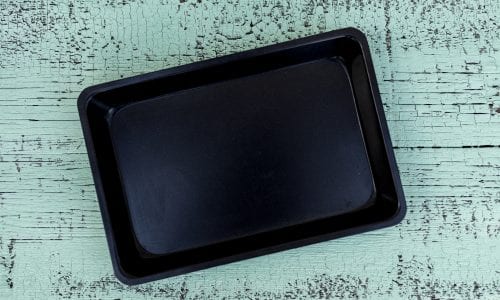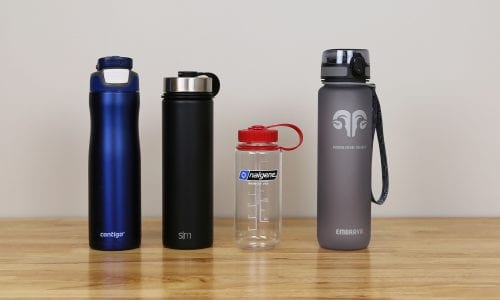The Best Refrigerator Drip Catcher
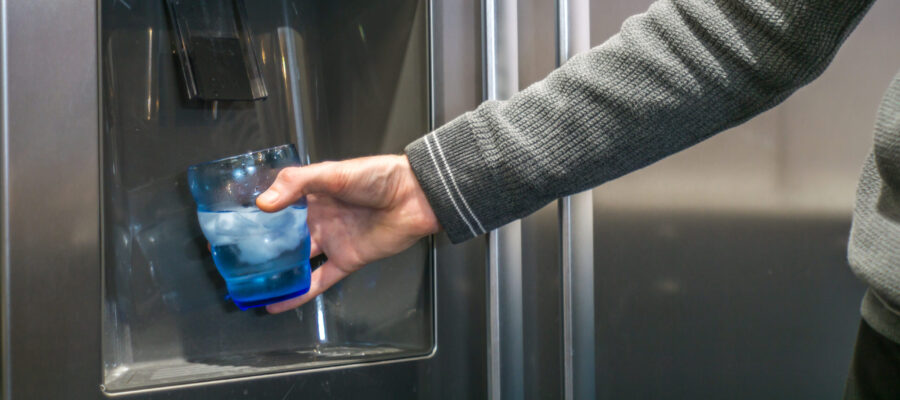
Our Review Process
Don't Waste Your Money is focused on helping you make the best purchasing decision. Our team of experts spends hundreds of hours analyzing, testing, and researching products so you don't have to. Learn more.
Our Picks For The Top Refrigerator Drip Catchers
- 1. The Drip Pad Absorbent Foam & Microfiber Refrigerator Drip Catchers, 2-Pack
- 2. Oyrlize Machine Washable Non-Slip Refrigerator Drip Catchers, 4-Pack
- 3. GE WR17X11655 Replacement Dispenser Tray Refrigerator Drip Catcher
- 4. Supplying Demand WR17X12910 Dispenser Tray Refrigerator Drip Catcher
- 5. LOPNUR Trimmable Quick Drying Refrigerator Drip Catchers, 4-Pack
- 6. Magicfour Slim Washable Microfiber Refrigerator Drip Catchers, 2-Pack
- 7. BlueStars Whirlpool & Kenmore Compatible Refrigerator Drip Catcher
- 8. FETTORLER Sponge Core Slip-Resistant Refrigerator Drip Catchers, 2-Pack
- 9. Maerolre Absorbent PU Leather Refrigerator Drip Catchers, 2-Pack
- 10. Simplation Stain-Resistant Anti-Mold Refrigerator Drip Catchers, 2-Pack
You'll get two pads in this set to help you find the perfect size for your refrigerator's drip tray. The pad absorbs up to four times its weight, grabbing water droplets and keeping the area beneath it dry. The inner sponge and microfiber layer can be washed, but you'll need to air dry it.
Easy to UseThis machine washable drip pad is easy to maintain and use for a versatile kitchen solution.
You'll get two sizes in this set. One measures 3.3” x 8.5” and the other measures 3” x 7.7”. The material can absorb up to four times its weight and is 100 percent machine washable for a no-fuss solution.
Customizable Option Two sizes and multiple color options help you customize this drip catcher to your own needs.
Designed for a specific line of GE refrigerators, this drip tray replaces the original tray. It is made from premium materials to ensure it will bring the same durability as the drip catcher that came with the appliance. The measurements are 7.5” x 4” x 0.8”, and it's measured to make an exact fit for the appropriate GE models.
Classic OptionThis drip tray has a streamlined look to blend well with your refrigerator tray.
Measuring 9” x 4½“, this drip catcher is designed as a replacement for the tray in a specific list of refrigerator models. The tray is slightly taller than the original in some fridges, so check to make sure your larger cups and tumblers will fit. Installation is simply a matter of sliding it into the compartment.
Durable BuildAlthough this is designed to replace certain refrigerator parts, the build is more durable than the original to resist corrosion.
Buying Guide
Tap water typically contains minerals that form at the source. As that water makes its way into your house, minerals come with it, landing on surfaces that include your skin, your sinks and the walls and flooring of your tubs and showers.
If you have a refrigerator with an outside ice and water dispenser, mineral buildup can be a problem there, as well. The area underneath the dispenser typically contains something called a drip tray, and that tray is made to grab any spills or drips that continue after you’ve filled your cup, glass, tumbler or bottle. Over time, you’ll start to notice a white stain that seems impossible to wipe clean. That’s the mineral deposit buildup, and it can turn that tray into an unsightly mess.
There are a few solutions for that mineral buildup. First, you can try to clean it. If you own a one-cup coffeemaker, you’re probably familiar with using a vinegar solution for the descaling process. Descaling removes built-on minerals from heated surfaces, helping keep them clean.
To descale a refrigerator drip catcher, you’ll fill a wide bowl with distilled vinegar, completely covering the tray. If you have calcium buildup on the area surrounding or beneath the drip tray, you can coat a towel in vinegar and set it on the area to soak. After a few minutes, the minerals should lift away, allowing you to wipe the area clean.
But all that hard work might not pay off. If that happens, you can simply replace the drip catcher. One option is a multilayered mat that can be cut to fit in the area. This mat captures the moisture and holds it, keeping it from getting to the surface of the fridge beneath. You can often machine wash these mats, although you might have to separate your mat before washing and air drying it.
Of course, you can also replace the drip tray with a newer one. Most refrigerator manufacturers sell replacement parts, and there are universal options that may be even less expensive. The important thing is to carefully measure your refrigerator’s tray area to make sure the replacement part will fit before you buy it.
What to Look For
- Your replacement drip tray might fit into the tray area, but the height could differ from the original. This might mean your taller glasses and tumblers won’t fit beneath the dispenser anymore. Note the depth and make sure you won’t be giving up valuable real estate in that area before you buy.
- Some drip mats can be cut to size, but others can’t. If you opt for one that can’t be cut, in some cases, you’ll get two different mats, each sized differently, to help you find the right fit.
- If aesthetics are a priority, replacing your original tray might be the best solution. You can find one very similar to the one that came with the appliance.
- When buying a replacement tray from the manufacturer, note the part number. Often, they’re designed to fit only a small subset of models. You might have to match the part number listed on the retailer’s site to the part number on the manufacturer’s site.
- The best thing about drip mats vs. trays is that they are built to absorb a large amount of water. That means you can leave them in place longer than a drip tray.
- If you’re buying a replacement for the original tray, make sure it’s made with the same quality of materials as the original. Some secondary sources sell trays built to look like the original, but you might not get the same durability.
- Pay attention to the installation instructions on any drip tray you’re considering. Most can be slid into place with no tools necessary, but not all trays will form that snug fit. You’ll want a tray that will grip the surface beneath and avoid sliding around easily when bumped by a glass, bottle or tumbler.
More to Explore
When they came along in the 1980s, water dispensers were a huge innovation in the refrigerator market. Without even opening the door, household members could enjoy a glass of water. But these initial models merely dispensed tap water, with no filtration option. That meant you got the same effect you would enjoy by merely turning on the sink faucet.
What those earliest consumers might not have realized, though, was that adding the water dispenser was only the beginning. As manufacturers added the ability to dispense chilled water and ice, then filtration, the prices of these state-of-the-art appliances skyrocketed, and households found they only added to the need to repair the fridge. Over time, though, that has leveled off, and exterior water dispensers are not only fairly common but less likely to break during the refrigerator’s lifetime.

